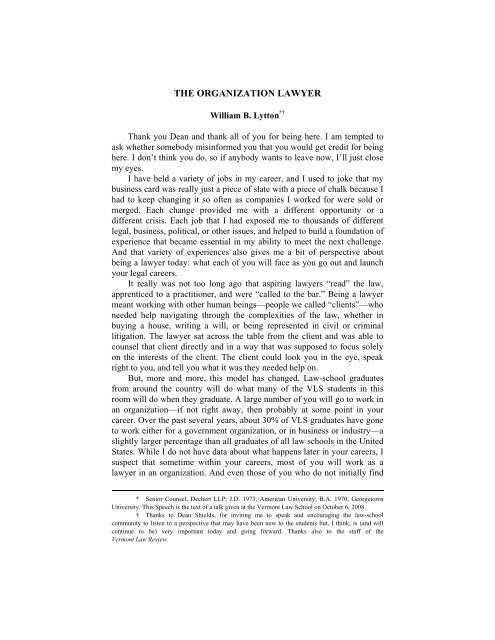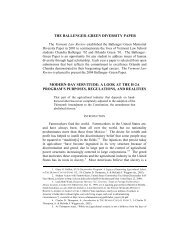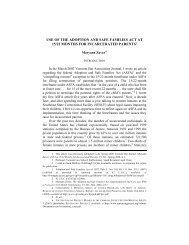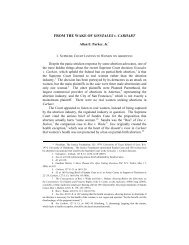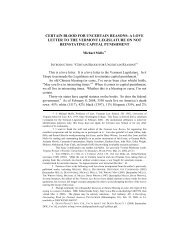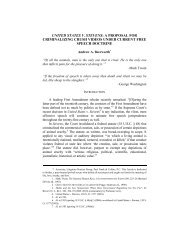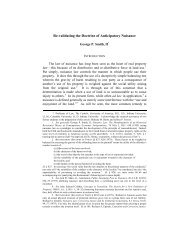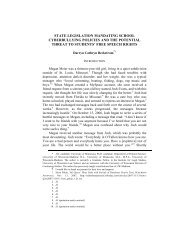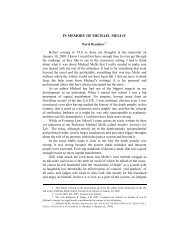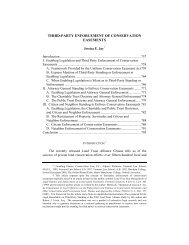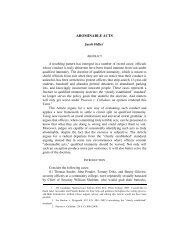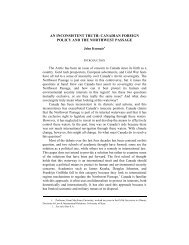The Organization Lawyer William B. Lytton - Law Review - Vermont ...
The Organization Lawyer William B. Lytton - Law Review - Vermont ...
The Organization Lawyer William B. Lytton - Law Review - Vermont ...
Create successful ePaper yourself
Turn your PDF publications into a flip-book with our unique Google optimized e-Paper software.
732 <strong>Vermont</strong> <strong>Law</strong> <strong>Review</strong> [Vol. 33:729This structural dynamic requires that the organization lawyer have awell-developed set of antennae to be aware of the challenges, risks, andopportunities that the lawyer in a more traditional private practice might nothave to deal with.Let me first discuss some of the personal qualities that you will need tohelp guide you as you start your professional journey, wherever that maytake you. Before you find yourself in a position within an organizationwhere you will be called upon to offer advice, you should first pause andtake a personal inventory: consider who you are, what your strengths andweaknesses are, what are the real challenges that you will face, and whetheryou have what it takes to work—and succeed—as a lawyer in anorganizational environment.You need to think about, and have a mature understanding of, how andwhy good people—just like you—made mistakes that caused companies,jobs, reputations—and in some cases their personal freedom—to disappear.Don’t doom yourself to repeat the lessons of history because you have notlearned those lessons. <strong>The</strong> stories of Watergate, Enron, WorldCom, ArthurAndersen and others make for more than just interesting reading. <strong>The</strong>German expression “Schadenfreude” means the unanticipated delight inthe suffering of another. If that is all we got from these recent histories,then we have learned nothing worthwhile at all. <strong>The</strong>re are indeed lessonsto be learned.Some of these lessons I learned as a result of my joining Tyco after thescandal had exploded on the front pages of the papers, and the CEO, CFO,and General Counsel had all left the company under a cloud. All of asudden, I was the new General Counsel in what was then a $38 billioncompany with 2300 subsidiaries around the world and 260,000 employees.We were suing the CEO, CFO, and GC who had preceded us, and each ofthem was under indictment. We literally had no one to give us any advice orinformation—such as where the bathroom was or where the documents weneeded to do our jobs were kept. Of course, just about every document atTyco’s headquarters was in one box or another going to some governmentoffice pursuant to a subpoena. Adding to the challenge was that the formerGeneral Counsel was a friend. He and I had worked together when I was atthe White House—he was on the Senate staff; I was in the White House.Yet, he was under indictment and on behalf of Tyco I was suing him, and soit was a very personal situation. I have given a lot of thought to how thisman I knew as an honorable, competent, and decent lawyer had ended up inthat situation, and how other good lawyers in other organizations had foundthemselves in such dire circumstances.
2009] <strong>The</strong> <strong>Organization</strong> <strong><strong>Law</strong>yer</strong> 733One thing that I have concluded is that in addition to studying the law,the regulations, and the ethical rules that guide all of our behavior aslawyers, you need to think also of the twin roles in the organization that youwill simultaneously play as both a leader and as a follower.Every member of the VLS community is a leader, and you will be aleader within any organization with which you associate. This will, in part,be because in every social group, people at every level are leaders in someway. And, that has nothing to do with title, pay grade, or seniority. This isespecially true for lawyers. <strong>The</strong>re is an enhanced recognition of lawyers asleaders. And, as lawyers and leaders, you will have a special spotlight onyou, as people will assume you are “learned in the law,” perhaps even wise,with a keen sense of not just what is legal, but what is right.So, what is leadership? How did we define this concept of leadership inthe organizational context in the past—and how should we think of it in thefuture? If we go back into recent history—and perhaps even to today’sheadlines—being a leader in government, business, or other organizationshas meant power, influence, fame, celebrity, and often great personal wealth.How have others thought of leadership in different contexts over theyears? A traditional theme of leadership is that the leader owes a number ofduties to those who follow him or her. Among those duties are—and should be:1) Service: that is the most frequent trait of leadership I have seen in bothmy own experience as well as in what I have read on the subject.• You can go back to the Gospels where St. Matthew wrote, “Andwhosoever will be chief among you, let him be your servant.”Matthew 20:27• And, Martin Luther King, Jr. said, “Everyone can be great becauseeveryone can serve.”• Service is traditionally the cornerstone of what leadership is allabout. You don’t aspire to be a leader for the power; you aspire tobe a leader because you can serve others.2) Inspiration: leaders inspire people.• “A leader who does not inspire is like a river without water,” LanceSecretan, a friend of mine, wrote. That inspiration can be for eithergood or not. We’ve seen both. We can inspire people with ourwords—but more importantly, by our actions. St. Francis of Assisifamously said, “Preach constantly. When necessary, use words.”What he was saying was that people are going to look at what youdo and make judgments and conclusions about who you really areby your actions.
734 <strong>Vermont</strong> <strong>Law</strong> <strong>Review</strong> [Vol. 33:729Other criteria of leadership are:3) Vision: having a vision and being able to articulate it in a credible andcompelling manner.4) Honesty: being believable, and being a person whose word is indeed hisbond.5) Integrity: articulating standards of behavior, and then acting and livingconsistently with those standards.6) Finally, Encouraging Personal Growth: allowing, encouraging andbeing a catalyst for others to grow and become leaders in their ownright.<strong>The</strong>se indicia of leadership are not the exclusive domain of the CEO, theelected official, or the person in the media spotlight. <strong>The</strong>y are qualities thateach one of us aspires to in our role as leaders, whatever our position withinany group or organization.With regard to many of the past corporate and government leaders whohave found themselves and their companies in the news, the courtrooms,and sometimes in prison cells, they failed as leaders. <strong>The</strong> leaders forgot thatleadership is about serving others, not about serving oneself. <strong>The</strong> leadersforgot how much they needed to set an example by what they said and whatthey did. I think of Mr. Kozlowski, the former CEO of Tyco. I never methim, but I spent a lot of time repairing the damage that he was responsiblefor and I saw the legacy that he left behind. I submit that he is a realexample of someone for whom it was all about him, not about thosewhom he should have been serving. He and other leaders forgot howmuch they needed to set an example by what they said and what they did.<strong>The</strong>y forgot that they were teachers who should have been focused onpreparing the next generation of leaders to take over and become servantsof their followers. <strong>The</strong> leaders forgot that they needed to provide anatmosphere—a culture—in which followers were not only encouraged tospeak up and offer a contrary position, but where a lack of candor fromfollowers was unacceptable.Let me talk about the second duty. Everyone in this room is today, andwill always be, not only a leader, but a follower as well. Now, sayingsomeone is a “follower” has kind of a pejorative connotation to it thesedays. But, I am talking about followership as a quality and attribute towhich each of us should aspire.
2009] <strong>The</strong> <strong>Organization</strong> <strong><strong>Law</strong>yer</strong> 735While we focus a lot in our society on leaders, equally important is therole we all play as followers. <strong>The</strong>re is no leader that does not, at the sametime, follow, answer to, and owe a duty to someone, whether it is a boss, adean, a board, the Congress, “the people,” or even “the Community andthe World.” 1Fundamentally, followers owe a duty to their leaders and to theorganizations in which they serve. Simply stated, that duty is to help theleaders make the right decisions, and to remember what is reallyimportant. A loyal and faithful follower is someone who recognizes andacts upon that duty.I submit that, in addition to a failure of leadership, there was a failureof followership that allowed some of the corporate and governmentdisasters that we are all familiar with to occur. Where were the followerswho warned the leaders that they had forgotten the true lessons andmeaning of leadership? Where were the followers who had the courage andthe candor to point out that the path taken and the decisions made werewrong? Where were the followers who reminded the leaders that theyshould focus more on being servants than on being served? Again, think ofMr. Kozlowski. Did anyone ever say to him, “Dennis, this is really wrong.What are you, nuts?” I don’t think anybody ever said that to him. And thatis a failure of all the people who worked with him, including the board.Perhaps if someone had reminded him of his duty as a leader, things wouldhave turned out differently for the company and for him personally.With this discussion of leadership and followership as a foundation, letme put these concepts in the unique context of being a lawyer working in,first, a government organization. Most of you remember something calledWatergate. Some of us lived through it. Others of us have read about it orheard our grandparents speak if it. I was a young lawyer working for a U.S.Senator back in the early ’70s, and one thing that always stuck in my mindwas the role and fate of a lawyer by the name of John Dean. We were bothgraduates of Georgetown University. John Dean was a young lawyer,barely thirty years old, who was put into a position of dealing with the mostpowerful people in the country. <strong>The</strong> Chief of Staff to the President of theUnited States and the Attorney General of the United States invited him totake the job of Counsel to the President and be part of the NixonAdministration’s “senior team.” John Dean wanted to be in the inner circleof power—he knew it would be good for his resume and his career. Hewanted to get phone calls from, and have meetings in, the Oval Office with1. This last item in the list is a reference to <strong>Vermont</strong> <strong>Law</strong> School’s motto, Lex pro Urbe etOrbe, which translates to “<strong>Law</strong> for the Community and the World.”
736 <strong>Vermont</strong> <strong>Law</strong> <strong>Review</strong> [Vol. 33:729the President. But, he forgot his role as a lawyer and his duty as both aleader and a follower.His desire to please his bosses in the White House and advance hiscareer and his ambitions became the catalyst for him to stop acting as alawyer who had higher professional—if not legal—obligations, and tobecome part of the crime and cover-up that eventually brought down aPresident. John Dean was not a loyal follower who counseled his leaderswhat the legal thing and what the right thing to do was—until it was toolate. And, because of his position as Counsel to the President, others whoregarded him as a leader were no doubt comforted or seduced into believingthat it was okay to do things that in their hearts they had to have doubtsabout. After all, the lawyer was involved and approving things. He wasgiving his implicit—if not explicit—imprimatur to those actions.As John Dean began to realize how much trouble he was in, hereflected on his career and his talents, and in a searing but probablyaccurate self-appraisal in a book he wrote afterwards, aptly called BlindAmbition, he concluded that he had “an organized mind, an ability to readthe desires of my superiors, a capacity to anticipate.” But he also said that“[d]eep down, I knew I was a meek, favor-currying staff man, nothardboiled enough to play the game.” Frankly, not the description you wantof a person advising anyone in a powerful position. I recommend JohnDean’s book to you, not only as a fascinating piece of history that hopefullynone of you will ever have to repeat, but as a way to question yourself as tohow you might have behaved—or might in the future react—under similarcircumstances or pressures.I recall that when I first read John Dean’s book some thirty years ago, Ithought to myself that, had I been in his position, I certainly would not havedone what he did. But, the more I thought about it, I was less confident thatif it had been me—someone that young, thrust into such a position ofpower and possibility, I would not have been tempted to take the first smallsteps towards that slippery slope where he eventually was coordinatingpaying hush money as part of a conspiracy to obstruct justice. I hoped Iwould not have made the decisions that John Dean did, but it is not thatdifficult to imagine yourself as a young, ambitious lawyer in the WestWing of the White House, overwhelmed by the place, the personalities, andthe power.With a new administration taking office in Washington next January,whether a Republican or a Democrat, I worry about all the young lawyerswho will join the administration, convinced of the wisdom andrighteousness of their cause, dazzled by the blinding light of power, seeinga possible eight years in power as an eternity, but lacking in the maturity,
2009] <strong>The</strong> <strong>Organization</strong> <strong><strong>Law</strong>yer</strong> 737experience, and self-reflectiveness that they will need to clearly keep theireyes, their minds, and their hearts focused on their legal and ethicalobligations as lawyers.In 1987, I was brought in to the White House as a young lawyer to beRonald Reagan’s lawyer in the Iran Contra investigation and to handle thehearings on the Hill and the Independent Counsel investigation. I hadagreed to do the job full time for six months (though I continued as a parttimeconsultant through the end of the Reagan Administration and alsoserved as Special Counsel to President George H. W. Bush, “41,” for part ofhis term). During those six months, I would often mentally pause as I ran upthe back stairs of the White House or walked around the West Wing, andthink how fortunate I was to be there. I did in fact think about how JohnDean had walked these same halls and used these same stairs, and I tried toremember the lessons from his time there and how he had failed. I also keptin mind that I had only signed up for six months to work on a specific task.<strong>The</strong> fact that I was a “short timer” gave me some perspective and anadvantage because I knew I was leaving. I wasn’t there as an ideologue or apolitical appointee; I was there as a lawyer to do a job.But we were also fortunate because President Reagan had theperspective and the wisdom to realize, as I heard him say many times, thathe was just the latest tenant of the office and he needed to leave it in at leastas good shape for his successors as he had found it. At his age, eight yearsprobably didn’t seem that long a time to him, and so I think he also thoughtof himself as a “short timer.”<strong>The</strong> President’s approach and perspective had an effect on all of uswho worked with him. <strong>The</strong> Counsel to the President for whom I worked, 2when we faced and discussed an issue, would ask the following questions inthe following order: What does the Constitution say? What does the lawrequire? What precedent might we be setting for whoever might bePresident ten to fifteen years from now? What are the politicalimplications? <strong>The</strong> decision was always made before we got to that lastquestion, but we asked it anyway because we needed to be able to anticipatethe reaction we would get. Sometimes as I walked on Pennsylvania Avenueand saw people waiting in line to take a White House tour, I thought tomyself that those folks would be proud if they knew that this was thetemplate we were using to make important decisions.In my estimation, both the President and the Counsel to the President,during the time I worked at the White House, set the right example as2. Arthur B. Culvahouse Jr. was Counsel to the President of the United States in the ReaganAdministration from March 1987 to January 1989. Mr. Culvahouse is now the Chair of O’Melveny &Myers LLP in Washington, D.C.
738 <strong>Vermont</strong> <strong>Law</strong> <strong>Review</strong> [Vol. 33:729leaders, and the Counsel very definitely was a loyal and faithful follower, inthe best sense of that word. <strong>The</strong>y both inspired me then, and in the yearssince, to try to live up to their examples.In the corporate context, while not as exciting as working in the WhiteHouse, the challenges are nonetheless daunting. A lawyer—workingwithin a corporation as a lawyer, as opposed to as a banker or anelectrician—has different responsibilities and risks than other nonlawyeremployees have. Over the past decade or so when a variety of corporatescandals filled first the news media, and later the courtrooms, the questionwas often asked by commentators, regulators, and judges, “Where were thelawyers?” <strong>The</strong> underlying assumption was that lawyers owed a professionalduty to have prevented the things that went wrong. And, if things did gowrong and lawyers were in the organization, the harsh light of scrutinyturned towards them.As an example, and you can see this in the press almost every week,the Wall Street Journal on October 6, 2008 published a column that notedthat “the role of not-very-careful lawyers will be Exhibit A in inevitablelawsuits against banks.” That’s true. <strong><strong>Law</strong>yer</strong>s these days always findthemselves under close scrutiny after something goes wrong. <strong>The</strong> trick iswhen you are at the table and the decision is being made—and a thousanddecisions are being made—to be able to figure out which of those decisionsis the one that may go south on you and cause trouble three to five yearsfrom now.As an organization lawyer, let’s think about how you may be calledupon to give legal advice—or how you may need to give legal advice evenif no one asks your opinion. <strong>The</strong> easiest counseling is at the beginning of aproposed deal or action. Someone comes to you and asks you to draft adocument, or structure a deal, or simply asks your advice, with theunderstanding, explicitly or most often implicitly, that it be done incompliance with the law. And, it will be the very rare case indeed whereyou will be asked to or expected to violate the law. It is the cases of allegedcriminal activity that get the most attention in the press and in thecourtrooms, but they are very much the extraordinary exception to the dayto-daychallenges that an organization lawyer faces. In the careers of mostlawyers, wherever they serve—unless you are consigliore to the CorleoneFamily—it is rarely the case where you will come upon a client whointentionally and knowingly decides to violate the law.More common are two situations. First, the client does not know whatthe law requires, but because of that ignorance, may propose an action thatcould violate the law or a regulation, or otherwise put the company at somelegal risk. This is especially true in the area of complex regulation, such as
2009] <strong>The</strong> <strong>Organization</strong> <strong><strong>Law</strong>yer</strong> 739environmental regulation, the tax code, and the area of governmentcontracting. <strong>The</strong> actual statutes involved in each of these areas are complexenough, but the regulations implementing them have grown to gargantuanproportions. Federal Acquisition Regulations, or FARs, are nonintuitive tothe uninitiated in this area. I used to joke in the aerospace industry thatwhoever signed a certification to the government that a hundred-pageproposal met all of the requirements of the thousands of provisions in theFARs was the “Designated Defendant.” <strong>The</strong> joke made some of mycontract administrators a bit nervous.When I went to law school, the tax code and regulations were regardedas the most complex set of rules yet devised by the minds of lawyers, butthat was before the environmental regulations grew to surpass them in bothlength and complexity—about 17,000 pages in the CFR—compared to alittle more than 12,000 pages for IRS regs. As someone trained in the areaof environmental law, you may often find that it is ignorance of the law thatyou are dealing with—not folks intent on poisoning the air or water andknowingly and intentionally risking jail in the process. And, as a side note,it is very often the plant manager of some manufacturing facility in somesmall community that may have the most day-to-day responsibility ofknowing what the law is and the most need of help to stay within itsbounds. You will find it is often this ignorance of the law rather thansomebody intentionally trying to do something wrong where you will beproviding important legal counsel.A second common situation is one in which the client wants to dosomething perfectly legal, but perfectly stupid. Usually, the short-term easeof the proposed solution ignores the long-term risk of the decision to theorganization. And, what today may be a dumb but legal decision may beviewed many years from now as not just dumb but illegal as well. Asperceptions and attitudes change, public and media pressures shift focus orintensify, a predictable result is that prosecutors, regulators, and courtsdiscover new theories by which administrative, civil, or criminalresponsibility may be alleged and prosecuted. For example, the Wall StreetJournal on September 24th, in the midst of the failures of some large banksand institutions, said: “Pressure is building for the FBI and regulators tohold top executives accountable . . . .” Translation: prosecute executivesand send them to jail. This is not surprising as a political matter. But whenthe public pressures federal law enforcement to find criminal responsibility,it points to the future; when things really go badly, we want to put someonein jail. <strong>The</strong> laws are complex and broad enough, and prosecutors andregulators are ambitious enough to be sensitive to political pressure, that itis not that difficult to come up with a new theory of criminal prosecution.
740 <strong>Vermont</strong> <strong>Law</strong> <strong>Review</strong> [Vol. 33:729It is in these two types of situations that most lawyers will findthemselves needing to provide counsel, guidance, and alternative solutionsto their clients that may—within an organizational structure—be bothpersonally and professionally challenging. Many of these situations willoccur in the context of pressure to meet internal corporate budgets or profitgoals, and publicly announced earnings targets for the stock. It is notuncommon for managers in a company to be told to “make your numbers.”That can be a typical and perfectly appropriate and lawful directive thatassumes that everyone will act in a way that will not place the company atlegal risk.Of course, context is everything. If someone asks you to go to the bankand get some money, are you being asked to use your ATM card—or a gun—to get the cash? When Bernard Ebbers was being prosecuted in Januaryof 2005 for crimes connected to his role as CEO of WorldCom, the federalprosecutor in his opening statement said, “When he said ‘hit the numbers,’it was a command to commit fraud.” That became the theme of theprosecution. But because of the reality that in almost every corporation,managers are saying “meet your numbers,” the context of when that issaid, as well as the culture of the organization that is given that directive,will be extraordinarily important for you as an organizational lawyer tointimately understand.As the organization lawyer, you have to understand that context,anticipate what is really behind the corporate directive, comprehend themotivations, understandings, and plans of those who are trying to achievethem, and be sensitive that whatever you do may be viewed years later in adifferent context if things do not go well. This is where understanding thetwin responsibilities as a leader and a follower are important.Your success as an organization lawyer will be measured by how wellyou can function—as a lawyer with special responsibilities—within theculture of the organization, how you navigate the politics that exist in anygroup larger than one person, and how well you are able to act as both agood leader and a loyal and faithful follower. Your judgment, yourintegrity, and sometimes your courage, will be your tools as youdetermine when and how—not whether—to fulfill your uniqueresponsibilities as a lawyer.With all of this in mind, let me offer a couple of hypothetical situationsthat would not be unusual for an organization lawyer.First, your boss asks you advice about a proposed action. <strong>The</strong> action isnot illegal. But, you think it exposes the client to too much risk. You adviseagainst it. Your client decides to go forward notwithstanding your advice.What do you do? Do you write a memo to the file about how your boss did
2009] <strong>The</strong> <strong>Organization</strong> <strong><strong>Law</strong>yer</strong> 741not follow your advice? Such a memo might be a very good thing for you tohave in your file in case some day five years from now the investigatorscome knocking on your door. You’ll be able to say, “Hey, I told them not todo it—here is my contemporaneous memo.” But if you do that, you may besaving yourself at considerable risk to your client by putting such adocument in your file. Do you volunteer the information to a member of theBoard? Do you seek the opinion of outside counsel and ask her opinion asto what to do? What if outside counsel agrees with you? What if outsidecounsel agrees with your boss? What if you go to the board meeting and theCEO presents the proposal and doesn’t mention the fact that you didn’tthink it was a good idea? Do you say, “ehem, excuse me . . . ?” What if oneof the board members says, “Well, what do you think about this idea?”What if in a side meeting the chairman of the audit committee comes up toyou and asks, “Do you really think this is a good idea?” Does it make adifference if your concern and advice were based upon your legal analysis,the business consequences, or the Corporate Social Responsibility issues?<strong>The</strong> second, I preface with a story. When I was working for LockheedMartin, we built and sent spacecraft to Mars. One of those spacecraft waslaunched and after a while, we never heard from it again. We had to try tofigure out what happened to it. I found myself as the company lawyer tryingto counsel a room full of rocket scientists as they drafted a public report onwhat might have happened out in space. <strong>The</strong> essence of the report wasaeronautical engineering, a subject that I didn’t know anything about. <strong>The</strong>only way I could be effective and helpful was to constantly questionstatements or conclusions in the report and see if in fact there were facts tosupport them, or whether the engineers were simply making educatedguesses. It was amazing how the draft report changed as a result of a lawyersimply asking questions about the language in it.What if you are sitting in a senior-management meeting and somethingis being discussed that you don’t know much of anything about, such asfinancial issues, accounting issues, or engineering issues—and you don’thave a clue about what’s being discussed? Do you get up and leave theroom and say, “Obviously, this is above my pay grade. Just call me whenyou get to something legal”? (That’s probably not a good idea for yourcareer.) Do you say, “Excuse me, I don’t have a clue what you all aretalking about. Could someone explain it to me?” And they say, “Okay,we’re going to have Accounting 101 or Engineering 101,” at which pointeveryone looks around the room and says, “What a dummy this guy is.”What do you do? Do you make a memo to the file? What if you stay in theroom and don’t say anything, and then years later the decision that wasmade in that room—while you were thinking, I don’t know what the heck
742 <strong>Vermont</strong> <strong>Law</strong> <strong>Review</strong> [Vol. 33:729they are talking about—gets the company into trouble? When theinvestigators come knocking on your door, do you say, “You know, I wasin that meeting, but I didn’t know what they were talking about”? Thatmight not be a very credible defense from a legal point of view, andimagine how it would look on the front page of the New York Times.<strong>The</strong>se are difficult questions and there may be no clear answers. But,they are the types of challenges you may face working as an organizationlawyer that you would probably not face if your client were a real humanbeing sitting across the table from you.While you have the time and the opportunity, and before you work foran organization, I encourage you to take time to reflect upon how othershave succeeded or have failed in recent history, and why. Most of thepeople who have become infamous for their misdeeds in the corporateworld or in government, or indeed in law firms or nonprofits, were not evilpeople. Indeed, most of the lawyers who have found themselves in troublein these situations were not evil people. But I think that they got themselvesinto trouble by not understanding at the very beginning that working as alawyer in an organization carries some unique risks and challenges.To be a good and valued lawyer in an organization, you will have to beable to discern, analyze, and offer advice on a myriad of issues. But, howdo you recognize a problem when it either shows up in a conversation orlands on your desk? Rarely do they come with red flags attached.Somewhere in that 80-page PowerPoint presentation, or somewhere amongyour 300 daily e-mails, or even somewhere among the pile of junk in yourinbox on your desk, may lurk a hint of an issue that could become a “bet yourcompany” lawsuit or investigation. And, if it does, rest assured that therewill be an evidentiary trail to prove that it was brought to your attention.<strong>The</strong> best way to spot these issues is to have seen it before in your priorexperience. One thing that gave me constant comfort when I joined Tycowas that almost all of the problems I saw were, in one way or another,similar to issues that I had seen in my various types of practice over theprior thirty years. Yet, one of the things that gave me constant discomfortwhen I joined Tyco was the gnawing fear that there was some problemlurking that I had never seen before and that I might not even recognize. Iworried that because of my inexperience and ignorance on a particularissue, I would miss it and put my company into jeopardy.In an effort to help avoid that fear becoming a reality, I have alwaystried to have around me experienced colleagues who are much smarterthan me. And, I make sure that the lawyers with that experience andintelligence get a chance to see as much as possible. I would often refuseto approve or pass along some document until and unless someone who I
2009] <strong>The</strong> <strong>Organization</strong> <strong><strong>Law</strong>yer</strong> 743knew had the requisite experience had looked at it and given me theirthoughts on it.It is the rare lawyer who knows the answer to every possible legalproblem. In fact, if someone told me that he was such a person, I wouldcheck to make sure I still had my wallet. <strong>The</strong> truly great lawyers do notknow all of the answers, but they do know all of the questions. I havealways thought that if I knew the questions, I could find out the answer. Ihad to learn to have the confidence to say to the Board or the CEO, “I don’tknow the answer, but I will find it and get back to you.”In-house counsel need to keep learning, reading, and gaining from theexperience of others so that they will be able to know the questions to ask.When I was a trial lawyer, I knew everything there was to know about theparticular subject that was at issue, whether it was how to read an EKG so Icould cross examine an expert cardiologist, or how internal bankingdocuments could be manipulated in an internal fraud. But, once the trial wasover, I forgot most of what I had learned and I went on to the next trial topic.As in-house counsel, you need to be an expert on everything. You needto read a number of newspapers every day, including the Wall StreetJournal and other business focused publications, so you can be aware ofwhat is happening in the world of business. Your CEO and your Board willsurely be reading them and they will expect you to be as up to date as theyare. You need to read the professional publications that highlight the legalissues that other organizations are grappling with, or that may have snaredthe unwary. You need to know what political issues around the world mayimpact your organization’s business going forward. Exchange rates, laborissues, government corruption, parliamentary elections—all of these maywell become relevant at some point. So, be a voracious reader, attendseminars, and stay up to speed on emerging trends in the law, regulatoryand legislative issues, and enforcement and prosecution theories.You also need to know what it is that the people who are likely to beon the other side of litigation are working on. If you are a big company,class-action plaintiffs’ lawyers are probably having seminars and writingarticles about new theories of liability they can use to sue your company.For example, there is a company, now part of LexisNexis, called Mealey’s,which sells subscriptions to periodicals, which anyone can buy, dedicated tothe latest theories of liability that plaintiffs’ lawyers are talking about. <strong>The</strong>yhold conferences on these topics where lawyers discuss their theories,tactics, and strategies. Likewise, lawyers who tend to represent defendantsin civil actions hold similar conferences and publish articles on these sameissues from the defense point of view. <strong>The</strong>se can be gold mines ofinformation that will help fill the experience voids in your career. Don’t be
744 <strong>Vermont</strong> <strong>Law</strong> <strong>Review</strong> [Vol. 33:729afraid to show up at “the other side’s” conferences if you really want tolearn what may be coming your way in the future.Once an issue is spotted, where can you go for guidance? If there isclearly an ethical or serious legal issue, then you may want to consult thelocal rules in your jurisdiction as to your ethical obligations and restrictions.But, keep in mind that the rules vary from state to state. Since mostorganizations are now multistate, and indeed multinational, the rules thatyou need to follow may be found in several places, but may be inconsistent.Assume you are admitted to practice in three states, each of which hassomewhat different rules. Assume further that you are in one of your homejurisdictions when you learn of a problem at your company’s manufacturingfacility in a second jurisdiction in which you are admitted, but that theimpact of a proposed action will take place in many different states,including the third jurisdiction to which you are admitted. You will need toknow whether you are prohibited from exposing the danger of the proposedaction, required to do so, or if it is up to you to decide whether or not to doso. And that will depend to some degree on the nature and type of thepotential harm—is it financial, or might it impact the health or safety ofhumans? If the requirements of these three jurisdictions are contradictory—well, welcome to the real world. You will need to seek expert advice—andprobably document it—not only to do the right thing but to protect yourprofessional license and reputation.Likewise, there could be an instance where a lawyer in an organizationbecomes aware of a situation that falls within the requirement of Sarbanes-Oxley’s duty to “report up the ladder.” 3 In that case, you will probably atleast want to review the language of the law which, as is often the case withhastily drafted legislation that was the result of various politicalcompromises, may not provide as clear an answer to your question as youwould hope. But, there are usually experts around whom you can consult tounderstand the requirement of the law.More typically, the types of issues that you may spot and that maypuzzle you cannot be resolved by going to the law library. <strong>The</strong>y may be thetype of issues that you really can’t discuss with anyone other than someonewho is in your position in a different organization. That is wherenetworking among organization lawyers becomes crucial. In the real world,the most typical way these tough issues are analyzed is by one in-house3. See 15 U.S.C. § 7245 (2006) (authorizing and directing the Securities and ExchangeCommission to promulgate rules of conduct for attorneys “practicing before the commission”); 17 C.F.R.§§ 205.3(a)–(b) (2008) (requiring “up the ladder” reporting of ethical violations by issuers of securities).See generally Sarbanes-Oxley Act of 2002, Pub. L. No. 107-204, 116 Stat. 745 (codified in scatteredsections of 15 U.S.C.); 17 C.F.R. §§ 205.1–7 (2008) (regulations implementing Sarbanes-Oxley).
2009] <strong>The</strong> <strong>Organization</strong> <strong><strong>Law</strong>yer</strong> 745counsel calling another and asking, “Have you any experience in thissituation . . . ?” And then giving enough facts to help explain the problem,but not too many to risk divulging privileged information.A hallmark of in-house counsel is their willingness to help colleaguesnavigate through difficult and thorny issues, even though they may work forcompetitors. In the corporate world, there are a number of organizationsthat can provide this type of networking and help. <strong>The</strong> Association ofCorporate Counsel (ACC) is the largest organization of in-house counsel inthe United States. <strong>The</strong>y have chapters in most major cities or geographicareas, as well as in a number of countries around the world. <strong>The</strong>y also havesubject-matter national and international committees. At the Chief LegalOfficer level, there is the Association of General Counsel, composed of theGCs from the top companies in the United States. <strong>The</strong>y meet twice a yearand have formed a tight network of colleagues who struggle with many ofthe same issues that anyone involved with a large multinational businessmay encounter. <strong>The</strong>y share confidences, problems, and advice freely in aneffort to help everyone come up with the best answers possible. <strong>The</strong>re arenumerous other organizations of lawyers that focus on particular industriesor legal issues that one can join. Developing your own network of lawyerswhose judgment, experience, and discretion you can rely upon will greatlyenhance your ability to spot issues, and work through problems where theredoes not appear any clear “right” answer.Whatever you do, find your network. Don’t think you can do thisalone, that you can become an organization lawyer for the first time and notneed help, guidance, support, and good advice. No one is that self-sufficientor that wise.Some of you may be like me. I seem to think better when I am talking.I find the discussion of a problem with a colleague—where pros and consare considered, potential varying factual situations are discussed, and wherewe can challenge each other in a collegial fashion—helps me to pick myway through legal or practical minefields and determine the course of actionI will take and the advice and counsel I will give my client. Find someonewith whom you feel comfortable to have these types of conversations.<strong>The</strong>se external sources of help, combined with the results of your ownpersonal inventory, will be invaluable to help you be a successful lawyer aswell as a successful employee of your organization.Being an ambitious employee who aspires to promotion and greaterresponsibility and visibility within an organization or a chosen field ofendeavor is not necessarily wrong or misdirected at all. But, it can blindyou—or at least blur your moral compass—as you try and navigate betweenyour own career’s advancement and the acceptance and esteem of your
746 <strong>Vermont</strong> <strong>Law</strong> <strong>Review</strong> [Vol. 33:729colleagues. You are not like every other employee. As a lawyer, you haveresponsibilities greater than everyone else. And sometimes, those uniqueresponsibilities may require you to have to choose between advancing yourcareer in an organization, or doing what you think is right.Being a “lawyer leader” in an organization is a huge challenge,especially when you are not the leader. Certainly, people will look up toyou because you may be at a higher organizational level. But, no matterwhat your level within the organization, people will look up to you becauseof your status as a lawyer. You will be amazed that years later, people willcome to you and recall how you reacted or what you said at some crucialpoint in their lives, but that you have no recollection of. That is when youwill see the impact of your leadership. Service, doing the right thing—legally as well as ethically, and setting the right example—these are theduties of leadership.Being a “lawyer follower” in an organization requires courage,integrity, judgment, tact, and resolve. As a lawyer, it is your job to steeryour client, and your bosses and coworkers, away from legal risk andtowards positions that do not expose the organization or themselves—oryourself—to legal risk or public vilification. It can sometimes be verydifficult to summon the courage to do that. Frankly, it is difficult to raiseyour hand in a public meeting, in a board meeting, in a senior-managementmeeting, or even in a one-on-one with the CEO, and offer a contrary view.If, when you considered John Dean’s self-evaluation of his character, youthought, “Gee, that sounds like me,” then maybe a legal job within anorganization is not for you.Sometimes, you do indeed have to “Just Say No” to your boss orsomeone else within your organization. But, as useful as “Just Say No” maybe as a first step, a wise lawyer will never let it be the only piece of adviceoffered. You have to help people see which path is the best to take, not justwhich path they need to avoid.<strong>The</strong>re is an old story of a fellow in a hot-air balloon who was lost overthe countryside. Spotting a person on the ground below, the balloonistyelled out, “Where am I?” <strong>The</strong> fellow on the ground replied, “You are in aballoon, hovering several hundred feet off the ground.” <strong>The</strong> balloonist said,“Say, I bet you are a lawyer.” <strong>The</strong> other fellow replied, “Why, yes I am.How did you know?” And the balloonist answered, “Because what you toldme was perfectly accurate, but perfectly useless.”“No” may be a perfectly accurate and appropriate answer to a legalissue, but unless you offer something else, it may be pretty useless. <strong>The</strong>better answer to your client is, “No, but . . . ,” followed by a suggested paththat will help achieve the organization’s goals but avoid or mitigate the
2009] <strong>The</strong> <strong>Organization</strong> <strong><strong>Law</strong>yer</strong> 747legal risk associated with it. And, sometimes, you must provide this adviceand counsel when you are not asked to, or even when it is not welcome.<strong>The</strong>se are the duties of followership.Eventually, every lawyer builds up enough experience that the times hefeels he needs to consult books or even other people diminishes. But neverbe so cocky and self-assured that you believe you cannot benefit by askingfor an opinion, by kicking around a problem with someone you trust, and byfalling back on all of those things you have learned outside of the lawschoolenvironment. Constantly trying to understand and to do the rightthing, and providing the example or advice to help your clients do the rightthing—legally, ethically, or business wise—is not a project. It is a neverendingjourney. As with any long journey, we need to plan ahead andcarefully assemble all of the tools we will need to be able to successfullynavigate what may be a difficult and obscure path.Lou Holtz, the football coach, has said that whenever anyone meetssomeone new, they instinctively ask themselves three questions about thenew person: Can I trust you? Do you care about me? Are you committed toexcellence? Or, in other words: Do we share the same values?At the end of the day, you will want to be part of an organization and ateam of people who all can answer “yes” to Coach Holtz’s three questions.You trust each other. You care about each other. And, you share the samevalues. If you cannot answer “yes” enthusiastically and emphatically toeach of these questions, then you will know that it is not the rightorganization for you.Ralph Waldo Emerson said it well when he defined success:To laugh often and love much; to win the respect of intelligentpersons and the affection of children; to earn the approbation ofhonest citizens and endure the betrayal of false friends; toappreciate beauty; to find the best in others; to give of one’s self;to leave the world a bit better, whether by a healthy child, agarden patch or a redeemed social condition; to have played andlaughed with enthusiasm and sung with exultation; to know evenone life has breathed easier because you have lived—this is tohave succeeded.In the end, whether you are evaluating a new job, or looking back over acareer, you will appreciate that the two most satisfying criteria for success,both professionally and personally are, first, to make a difference—whetherin the life of one person, a family, a town, a business, or a country or theworld; and second, to have fun doing it—enjoying what you do and thepeople with whom you do it, and finding the time to laugh.


